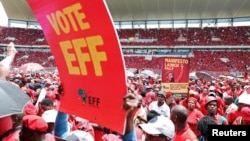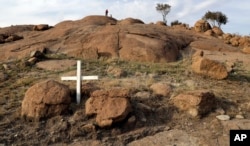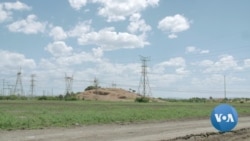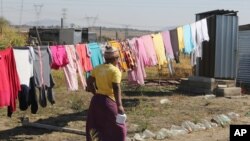This dusty South African mining town is perhaps best known for its darkest day: the 2012 police shooting of 34 striking mineworkers.
But anger over their deaths, and the systemic inequalities that remain 25 years after the end of apartheid, planted the seeds of a political movement that this year could upend the political status quo in a nation that has been ruled by the same party since the beginning of democracy in 1994.
From this soil, drenched with the blood of mineworkers, the Economic Freedom Fighters launched their far-left, radical political party in 2013. This year, as they approach their second national election, they stand a chance of making real gains in strongholds once controlled by the powerful African National Congress. The nation votes May 8.
Key wins for EFF
Already the party, which appeals to South Africa’s black youth, has come to dominate university politics, winning student elections late last year at several prominent institutions, including the University of Johannesburg, the University of Cape Town and the University of Zululand.
In adult politics, the party also won key municipalities in the 2016 vote.
EFF ward councilor Wendy Pretorius represents the small, undeveloped area of Wonderkop, which contains the sacred hill where the miners gathered in 2012 to strike against conditions at the Lonmin platinum mine. The roads around it remain unpaved, and residents live in sheet-metal shacks without water or electricity.
Pretorius said she supported the long-dominant ANC until the deadly strike.
“The time the killings happened, I was there with the other women,” she told VOA. “So, we were singing, waiting for the president of the country, Jacob Zuma. And Jacob Zuma, he never, never pitched. We were singing and waiting. And then, instead of coming to the mountain to see the people and to hear their side of the story, what’s happening, he just went to the hospital, to the management of Lonmin. After that, he (went) back. So, after that, it’s where we started to say, ‘You know what? It seems like we are not belonging here in South Africa.’”
WATCH: South Africa's Third Party Could Challenge Political Establishment
Criticisms of party
Critics of the party have pointed to its leaders’ fiery, sometimes race-baiting, rhetoric; at its far-left policies; at parliamentarians’ insistence on wearing bright red workman’s uniforms for official appearances; and its habit, in its early days, of getting into violent scuffles in parliament.
But in the past year, the party has grown in ambition and maturity. It has encroached on the ANC’s traditional base — South Africa’s poor black majority. Because of that fierce loyalty, the ruling ANC has been forced to pay attention to the far-left party’s calls for land redistribution without compensation.
At the local level, Marikana resident Nomxolisi Mafolwana said EFF representatives have brought positive change. Pretorius, she said, helped set up a small community project in which mineworkers’ widows sell chickens. That, she says, has improved their meager income.
“EFF has made a good change,” she told VOA as she plucked feathers from a freshly killed bird that she sold minutes later for less than $3 (R40). “She is trying, because this is not a place that it is people (who) live here. It’s a place (where) pigs live, not people.”
Urban supporters
The movement is also gaining supporters in urban areas, where adherents have protested for free university education and assistance for upwardly mobile young South Africans. Here at the University of Johannesburg, which has nearly 50,000 students, the EFF took over the Student Representative Council for the first time this year.
Chairperson and accounting student David Raphunga said the EFF strives to redress South Africa’s historic inequalities, beginning by taking back land that was seized centuries ago by European settlers.
“Our people are still suffering,” he said. “We are not in charge of the economic sector of South Africa. In the banking sector, we’re not in charge. The manufacturing sector, we’re not in charge. So, the land brings all that. When you have land, you are able to nationalize — nationalize your banks, you can nationalize your mines. All the resources and the profits, they are going to come back to the people. They benefit the people of South Africa, Africa and other parts of the world at large.”
Raphunga said at the end of the day, EFF supporters want what was promised to all South Africans when the apartheid regime fell in 1994: a stake in their nation’s potential.
“The people of London are owning a mine in Africa,” he said. “But right next to the mine, there’s an informal settlement. People are dying of hunger. There’s no free education. People don’t have water. They don’t have no electricity. There in Marikana, we should have a city like Johannesburg. Where is the profit going? It’s going to London. How? So, that must come to an end.”
Back in Marikana, Mafolwana translated those ideals into tangible suggestions.
“We want jobs,” she said. “We don’t have jobs. We want roads here. We don’t have roads here. And water.”








